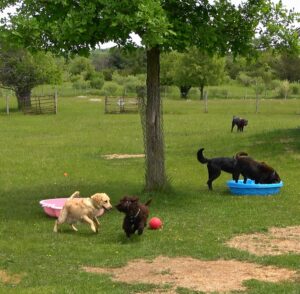Pets and Their People Blog
Visiting Public Dog Parks, or Not
It seems public dog parks are popping up all around the county I live in, and clients frequently ask me “What do you think about dog parks?” to which I reply, “I like the concept, but not like the consequences.”
What Is the Concept of a Dog Park?
A fenced property is provided for public use where folks may take their dogs to either play by themselves or with other dogs. Some parks have a single fence while others are divided into small dog spaces and large dog spaces. A permit may be required to enter the park and rules may be posted at the entrance, but to my knowledge activity inside the park is unsupervised and enforcement of park rules may be difficult.

I appreciate the idea of giving pet people who do not have a fenced yard a place where their dogs can run and play, but the park may also be populated with strangers and their dogs.
I attended a webinar presented by Suzanne Hetts, Ph.D., CAAB, CVJ and Daniel Q. Estepp, Ph.D., CAAB. Both are Certified Applied Animal Behaviorists, and the webinar topic was “Do Dog Parks and Doggie Day Cares Help or Hurt the Welfare of Dogs?” I thought the question was interesting, since there seems to be a public assumption that, “Of course it is good for dogs to play with one another.”
But is it?
Dogs have varying degrees of sociability, as do people. Scientists who study village or feral dogs have most often observed two or three dogs at a time spending time together, and then sometimes departing. They do not engage in large social interactions with unfamiliar dogs.
Putting a bunch of dogs who do not know one another in a confined space is not how dogs evolved over thousands of years.
What is the consequence?
Many of my clients over the last decade have taken their dogs to public parks and the consequence was a history of fun play and good exercise. Perhaps half reported positive outcomes. For the other half, everything was fine…until it wasn’t.
“Red Alert” Dog Behaviors
Sue Sternberg is recognized as an expert on dog parks, and she has identified five “Red Alert” behaviors to watch for:
1. Dog chases that get out of control and resemble a true predatory chase as additional dogs join the pursuit.
2. Mobbing, in which a group of dogs harass or control another dog.
3. Targeting, when one or more dogs repeatedly single out another dog for harassment or aggression.
4. Bullying, in which one or more dogs body slam, knock over or pin down a victim.
5. Hunting, which may also be called predatory drift.
Having worked in a dog daycare for five years, I have witnessed all these behaviors. Since I do not visit public dog parks, I rely upon reports, often from my clients, of such behaviors directed at their pets. Here are some examples:
- A colleague told me she took her Belgian shepherd (therapy dog) to a large and popular dog park. Immediately after passing through the gate, an unknown dog rushed from a distance and attacked, resulting in costly lifesaving emergency surgery for her pet.
- One of my clients came to me after she took her small dog to a park and saw only one dog on the large-dog side of the dividing fence. In a split second, the larger dog leaped over the fence and attacked. Her dog now has a generalized fear of all dogs and becomes defensive on sight.
- Another client came to me after her large bulldog was attacked at the same park, by a dog that police had banned for three previous attacks.
- Recently a client sought help with their adolescent golden retriever, who I helped work through a fear of dogs when she was a puppy. The family took her to a nearby park where she was attacked by two dogs, and days later I learned the same dogs had engaged in three prior attacks…yet the owner keeps taking his aggressive dogs to the park.
Many other trainers have shared similar accounts with me, and none of them take their own dogs to public dog parks. Nor do I.
What Are Safer Alternatives to Dog Parks?

A dog daycare is a good option if it is well-designed, well-managed, the staff is well-trained and the dogs are well-supervised and organized into playgroups according to size, age, and play style. This option is typically available Monday through Friday.
Private dog parks are properties which are available for rent, offering private time for a family and whoever else they feel safe inviting. What I have seen locally is that the private park is popular, and the booking schedule fills quickly, limiting options.
My favorite alternative is a private dog play session with a friend who has a securely fenced yard, and a friendly dog. Other safe dogs could be invited as well.
I offer this option on my property for dogs I have trained. We provide over two acres of grassy paddock space with plenty of toys and dog pools. There is at least one person per dog, and I provide resources to educate each person about active supervision and understanding body language. As the dogs play, I point out body language, suggesting appropriate play, and prompt intervention if things start getting out of hand.
All the dogs are healthy and sociable, the grounds are clean, the enclosure is secure, and dogs are invited on different dates according to their play styles. You may reach out to a trainer you trust, or a training club with indoor and outdoor environments to inquire about play sessions.
Videos of Dogs at Play:
Two Dog Play Session
Group Play Session
Editor’s note: If you’re looking to fetch more info on this topic, watch the Pet Professional Guild Advocacy Panel discussion, “Dog Parks- The Good, the Bad, & the Ugly” here.
About the Author
Daniel H. Antolec, PCT-A, CCBC-KA, CPDT-KA began teaching dogs in 2011 and founded Happy Buddha Dog Training. He teaches dogs in a way that makes it fun for pet stewards and pets alike.

